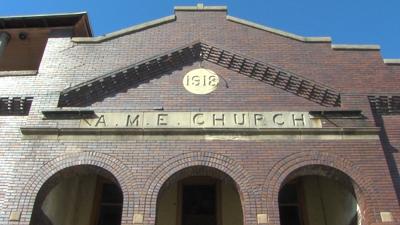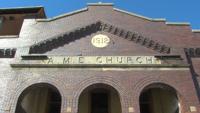
CAIRO, Ill. (WSIL) -- It was a hot summer night in 1971 when Rev. Jesse Jackson Sr. delivered remarks to a large audience at Ward Chapel A.M.E. Church in Cairo.
High school sophomore Ronnie Woods was watching from the balcony above, taking a break from handing out refreshments.
"This church has no air conditioning," Woods said. "There were so many people that I didn't bother sitting down in the lower part of the church."
The A.M.E-- African Methodist Episcopal-- Cairo congregation was founded in 1863 according to Don Patton, president of the Cairo Historical Preservation Project.
The church moved several times before settling on 17th street in the 1900s. The latest addition to the church was built in 1918 after a fire. Patton says the basement secretly housed slaves seeking freedom through the Underground Railroad.
Woods, a fourth generation Cairo resident, says the church was his childhood.
"I remember running up and down the steps and playing hide-and-seek in the church. I remember doing that with a lot of kids," Woods said. "It was where I grew up. It was where I lived. It was my social life."
It later became his responsibility. In 1981, Woods was asked to perform a sermon on Christmas Day after the elder pastor couldn't make it.
"They said 'Ronnie you should keep on doing this,'" Woods recalled. "I said to myself, 'Oh I don't know about this.'"
Woods was ordained in 2001 and returned to Ward Chapel in 2008 following stints in Marion, Harrisburg and Carrier Mills.
Since then, Woods has served as the pastor for the A.M.E churches in Cairo, Brookport and Metropolis. The last sermon at Ward Chapel was 2012. Almost all of its members are gone.
"I used to come to this basement and cry and think about the memories of the people here," Woods said. "It's very difficult."
Before organizing the March on Washington in 1963 and crossing the Edmund Pettus Bridge on 'Bloody Sunday' in 1965 Selma, Alabama, the late civil rights icon and U.S. Rep. John Lewis brought his 'good trouble' practices to Cairo.
Lewis helped organize peaceful demonstrations and marches to various restaurants, theaters and pools in the city in hopes of integrating the racially-divided city. Lewis did it all in Ward Chapel's basement.
That basement also hid runaway slaves as part of the Underground Railroad. Those reasons, and potential revenue, are why the church needs to be preserved Patton says.
"We need to respect the history of the town," Patton said. "Its a good way to develop tourism and economic development."
Last August, Landmarks Illinois awarded the preservation group a $2,500 to go towards fixing the roof. Patton says the group needs $60,000 to completely fix the roof so they can focus on the mold inside the building.
The grant gives Woods hope that he'll see another sermon at the church someday, or another generation of kids playing hide-and-seek on the church's cracked concrete steps.
"I'll never give up. I will go to my grave with the idea that Ward Chapel will come back in some form or fashion," Woods said. "It's just going to happen. It just will be."
To make a donation, you can visit the preservation project's website by clicking .


